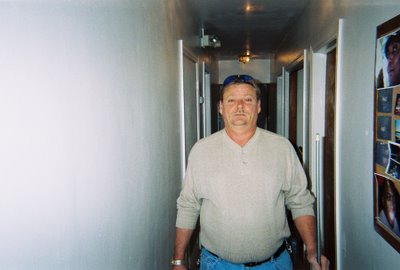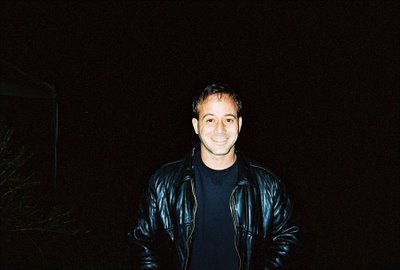
Carl Schrier has the look and voice that puts one in mind of Wallace Beery, the Hollywood actor of the 1930s who played in such movie classics as “Treasure Island” (1934) where he portrayed the lovable pirate “Long John Silver,” the father figure to the young Jackie Cooper who became a matinee favorite with his peg leg, parrot and eye patch.
This character of a pirate with a conscience is the persona of Carl Schrier who was born in 1957 in Salem, New Jersey, the son of a very competent skilled working man who had only one major flaw: alcoholism. Carl reports that he took his first drink at age 8 and continued to drink until 2001. He says that drinking was simply part of the family culture and it seemed to him normal. Carl relates that though a heavy drinker his father always took care of the family and never missed work, despite the occasional weekend when he indulged too much.
Like father, like son and Carl adopted both the negative and positive of his father’s character and became a highly skilled workman able to literally build by himself the average family home with an expert knowledge of carpentry, electrical installation, plumping, concrete work, carpet installation, dry wall installation, window installation, and so forth. In addition, Carl became a very competent welder, mason and diesel mechanic. If he had so desired, he could have become early in life a contractor and made a considerable fortune building private homes. Carl took these skills into the U.S. Army where he served for several years and given an Honorable Discharge and a Good Conduct Medal.
Carl relates that he rewarded himself for a hard day’s good work by drinking that often started with a breakfast beer and continued all day long and into the night. He reports that he always has able to work and never had so much as a hangover, but the intense use of alcohol put his nerves on edge and destroyed his family life and marriage, and resulted in legal difficulties including the loss of his driving privilege.
However, despite the obvious warning signs of alcohol addiction and a life that was clearly becoming unmanageable, Carl continued his lifestyle of hard work and excessive drinking until one day on the city bus (He was forced to take public transportation to work because his Driver’s License was suspended) in Lakeland, Florida he happened to pass by “Mission Possible” for the first time. He said the bus route was such that the bus rounded the block and a second time, then Carl heard a voice....
This character of a pirate with a conscience is the persona of Carl Schrier who was born in 1957 in Salem, New Jersey, the son of a very competent skilled working man who had only one major flaw: alcoholism. Carl reports that he took his first drink at age 8 and continued to drink until 2001. He says that drinking was simply part of the family culture and it seemed to him normal. Carl relates that though a heavy drinker his father always took care of the family and never missed work, despite the occasional weekend when he indulged too much.
Like father, like son and Carl adopted both the negative and positive of his father’s character and became a highly skilled workman able to literally build by himself the average family home with an expert knowledge of carpentry, electrical installation, plumping, concrete work, carpet installation, dry wall installation, window installation, and so forth. In addition, Carl became a very competent welder, mason and diesel mechanic. If he had so desired, he could have become early in life a contractor and made a considerable fortune building private homes. Carl took these skills into the U.S. Army where he served for several years and given an Honorable Discharge and a Good Conduct Medal.
Carl relates that he rewarded himself for a hard day’s good work by drinking that often started with a breakfast beer and continued all day long and into the night. He reports that he always has able to work and never had so much as a hangover, but the intense use of alcohol put his nerves on edge and destroyed his family life and marriage, and resulted in legal difficulties including the loss of his driving privilege.
However, despite the obvious warning signs of alcohol addiction and a life that was clearly becoming unmanageable, Carl continued his lifestyle of hard work and excessive drinking until one day on the city bus (He was forced to take public transportation to work because his Driver’s License was suspended) in Lakeland, Florida he happened to pass by “Mission Possible” for the first time. He said the bus route was such that the bus rounded the block and a second time, then Carl heard a voice....
Jesus spoke to me and told me to get off the bus and go into Mission Possible for salvation, which is what I did. I met a man named Brian who invited me to the Nazarene Church the next day where I was baptized. It was there that I met William Lowry and told him of my decision to accept Christ as my personal savior. After the church service, I traveled with William to Central Care Mission here in Orlando where I have lived since that time. This happened on June 2, 2001. I am now a staff member at CCM in addition to being in charge of maintenance at this facility, and I continue with a full time job as an electrician employed by Palmer Electric. In the near future I will return to Lakeland’s Mission Possible as the Director of that institution. My life before I met Christ was a living Hell, it was all about me and my wants, but now I see the outline of paradise, and it’s all about God and his needs, so I can rightly join Audie Murphy (World War II Medal of Honor winner) by saying that I, too, have been, TO HELL AND BACK.


